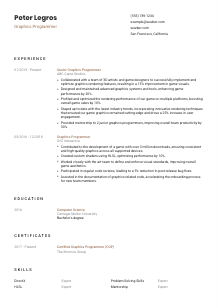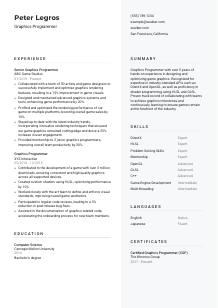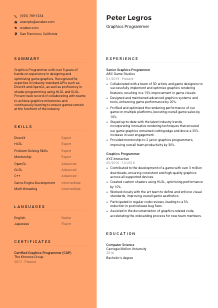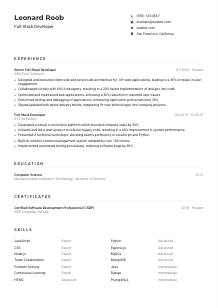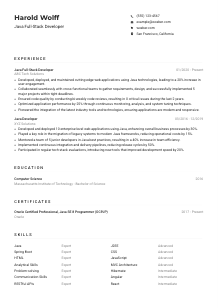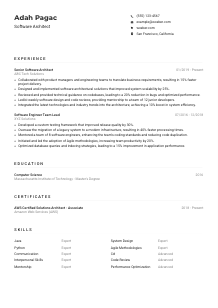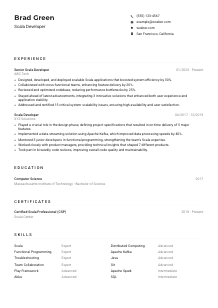Graphics Programmer Resume Example
Coding visuals, but your resume lacks pixel precision? Dive into this Graphics Programmer resume example, rendered using Wozber free resume builder. Discover how to blend your algorithmic genius with job shader requirements, mapping a career as visually groundbreaking as your renderings!
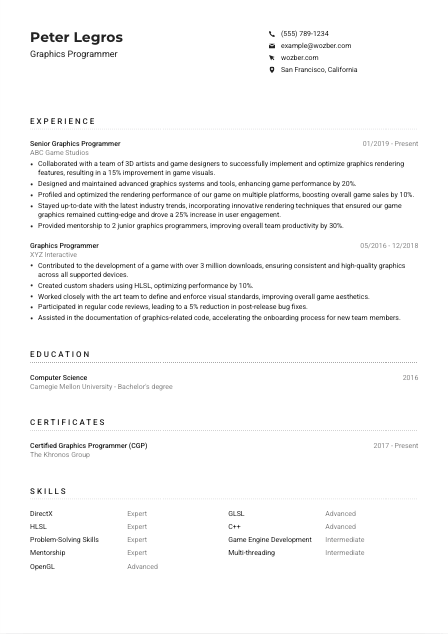
How to write a Graphics Programmer Resume?
Ahoy, visionary Graphics Programmer! If you're eyeing your next move in this pixel-packed domain, your resume is the secret level-up code you need. With the arena as competitive as a multiplayer final round, your resume isn't just a document; it's the protagonist of your career story. Ready to power up your resume game and make hiring managers hit 'Save'?
Using the Wozber free resume builder, let's decode the quest of creating a resume that doesn't just pass the ATS boss level but earns you the top score. Fire up your engines, and let's dive into creating a resume that beams you right into the Graphics Programmer role you're aiming for.
Personal Details
Every epic game starts with a character selection screen, and in the job hunt arena, your 'Personal Details' section does just that. It's your headline banner — clear, bold, and aligned with the mission. Let's tailor this section to reflect you're the chosen one for the Graphics Programmer position.
1. It's All in the Name
Consider your name the title of your personal game release. Make sure it's in a legible font and stands out. This isn't just the start of your resume; it's the start of your brand. Highlight your title 'Graphics Programmer' right under your name to mirror the role's targeted job title precisely.
2. Contact Like a Pro
In this digital realm, your contact info must be a click away. Whether it's a phone number or a professional email (stick to firstname.lastname@domain.com format), ensure it's typo-free. A glitch here could end your game early.
3. Map Your Location
Position your base! If you're in or ready to move to San Francisco as the role demands, make it clear. This not only checks a box but reassures your potential employer there's no boss battle with relocation.
4. Plug Your Portfolio
Got a GitHub or personal website showcasing your graphical conquests? Include it! Make sure it's a seamless extension of your resume, chock-full of your coding adventures, and updated to match.
5. Avoid the Unnecessary Side Quests
Skip the personal details that don't serve your quest to land the role. Personal trivia, like age or marital status, are random NPCs in this journey. Stay focused on the mission.
Takeaway
Your 'Personal Details' section is like the start screen of your career game — make it clean, functional, and tailored. By aligning it perfectly with the role's demands, you're telling your future team you're not just in the game but ready to play it on their turf. Beam this info with precision and professionalism, preparing your reader for the epic saga that lies ahead in your resume.





Experience
In the realm of Graphics Programming, your 'Experience' section is akin to showcasing your battle-won achievements and accolades. This part of your quest is about proving you've got what it takes, from coding spells to frame rate boosts. Let's make sure your experience screams 'Graphics Wizard' by aligning it with the role's requirements.
- Collaborated with a team of 3D artists and game designers to successfully implement and optimize graphics rendering features, resulting in a 15% improvement in game visuals.
- Designed and maintained advanced graphics systems and tools, enhancing game performance by 20%.
- Profiled and optimized the rendering performance of our game on multiple platforms, boosting overall game sales by 10%.
- Stayed up‑to‑date with the latest industry trends, incorporating innovative rendering techniques that ensured our game graphics remained cutting‑edge and drove a 25% increase in user engagement.
- Provided mentorship to 2 junior graphics programmers, improving overall team productivity by 30%.
- Contributed to the development of a game with over 3 million downloads, ensuring consistent and high‑quality graphics across all supported devices.
- Created custom shaders using HLSL, optimizing performance by 10%.
- Worked closely with the art team to define and enforce visual standards, improving overall game aesthetics.
- Participated in regular code reviews, leading to a 5% reduction in post‑release bug fixes.
- Assisted in the documentation of graphics‑related code, accelerating the onboarding process for new team members.
1. Decipher the Job Description
Your first mission is to dissect the job description. Identify the spells you know — DirectX, HLSL, shader programming — and prepare to showcase these powers. This role demands a mage who not only crafts enchanting visuals but optimizes them across realms (platforms).
2. Role and Realm
Lay out your previous quests, starting with the most recent. For each position, enlist your title, the realm (company), and your time spent there. This chronicle tells a tale of growth and conquest.
3. Quest Details
Here's where the magic happens. For each role, conjure a list of accomplishments that mirror the job specs. Did you optimize rendering features leading to frame rate boosts? Quantify these achievements. 'Enhanced game visuals by 15%' tells a story of impact.
4. Power in Numbers
Quantify your quest achievements. 'Reducing loading times by 20%' or 'Improving game sales by 10%' gives tangible evidence of your prowess. Numbers are the universal language of impact in any quest.
5. Relevance is Key
Keep your lore focused. While it might be tempting to list every minor quest, concentrate on those that showcase you're the champion they need for this Graphics Programmer role.
Takeaway
The 'Experience' chapter of your resume is where your professional journey truly comes to life. Like a well-played game, it should feel progressive, challenging, and ultimately rewarding. Each bullet point is a quest completed, a dragon slain. Focus on aligning your adventures with the role's demands, proving not only your prowess but your perfect fit for their guild. Let your experience narrate a compelling saga of skill, growth, and ready-for-anything resilience. You've got the achievements; now make sure they shine.
Education
In the graphics programming universe, your 'Education' section is like your foundational spellbook. It's essential, yes, but it's your application of this knowledge that truly matters. Here's how to make sure your educational journey contributes to the story you're telling.
1. The Keystone Spell
Your mission begins with identifying the alma mater of your programming wizardry. For instance, a 'Bachelor's degree in Computer Science' is a powerful spell required by many quests in this realm, perfectly aligning with our example job's demands.
2. Structure the Spellbook
Keep this section neat and orderly. List the name of the spell (your degree), the spellbook (your school), and the year you mastered it. If your magical journey includes graduating summa cum laude, let it be known.
3. Tailor Your Magical Disciplines
If the quest specifically asks for mastery of certain spells (like knowledge in DirectX or OpenGL), and your education journey directly aligns, make it prominent. A degree in Computer Science from Carnegie Mellon University, as featured in our resume example, is a beacon of your capability.
4. Highlight Key Magical Theorems
If there are specific courses or projects that directly relate to the Graphics Programmer role, mention them! Did you undertake a project on real-time rendering? This is the place to showcase such specialized knowledge.
5. Additional Achievements
Did your educational journey include accolades or memberships in prestigious guilds (honor societies, coding clubs)? If they reinforce the narrative of you being a stellar Graphics Programmer, include them, but gauge their relevance based on the level of the role.
Takeaway
Your 'Education' section grounds your resume in academic achievement and technical foundation. It's not just about listing your degrees; it's about showcasing the base upon which you've built your graphical prowess. Ensure it resonates with the role's demands, painting a picture of a well-prepared adventurer ready to tackle the challenges of the Graphics Programming realm. Your educational journey is a testament to your dedication and base knowledge. Let it serve as proof of your readiness to embark on this next chapter.
Certificates
In the quest for the Graphics Programmer role, think of certifications as side quests that boost your main attributes. They're not always mandatory, but when chosen wisely, they can significantly bolster your standing. Let's navigate which certificates can turn you from an adept mage into a revered master.
1. Identify Beneficial Quests
Begin by revisiting the job description. Although our example doesn't demand specific certificates, possessing something like a ‘Certified Graphics Programmer (CGP)' from The Khronos Group significantly endorses your expertise.
2. Choose Your Quests Wisely
Quality trumps quantity. It's better to have a few relevant certifications that directly enhance your appeal for this specific role rather than a long list of unrelated accolades.
3. Chronicle Your Achievements
For each certificate, list the title, issuing body, and date of achievement. This not only demonstrates your ongoing commitment to leveling up but also helps the hiring manager gauge the currentness of your skills.
4. Keep Questing
The tech world evolves at warp speed. Regularly updating your certifications, and pursuing new knowledge in areas like Vulkan API or ray tracing, spells continued relevance and ongoing allegiance to your craft.
Takeaway
The 'Certificates' section is your chance to showcase your dedication to self-improvement and professional development. It tells a story of a Graphics Programmer not content with stagnation but always seeking to push the envelope. By highlighting certificates closely aligned with the job's requirements, you underscore your commitment to staying at the forefront of your field. Let your certificates be the badges of honor that validate your expertise and passion.
Skills
Your 'Skills' section is like your inventory bar in a complex RPG: it needs to be carefully curated to ensure you're prepared for any challenge the game (or in this case, job) throws at you. In the world of Graphics Programming, both your technical prowess and your soft skills play a pivotal role. Let's optimize this inventory for ultimate impact.
1. Match Your Arsenal to the Quest
Begin by extracting key skills from the job description. Are they looking for a DirectX champion? A master of HLSL shaders? Make sure these skills are front and center in your inventory.
2. Curate Your Inventory
Focus on what's truly essential for this particular role. While being a multi-platform savant is impressive, make sure to prioritize the skills specifically listed in the job description to avoid clutter.
3. Balance Your Toolkit
In addition to your technical skills, don't forget to equip soft skills like problem-solving abilities and team collaboration. Mentioning your proficiency in both spoken and written English, as our job description requires, adds that extra layer of suitability for the role.
Takeaway
The 'Skills' section is where you get to show off the tools of your trade. It's about demonstrating not just your capability, but your versatility and readiness for the challenges this role presents. By carefully selecting and showcasing skills that align with the job's demands, you're proving you're not just any candidate — you're the right candidate. Equip yourself with the right skills in your resume, and you'll be ready to tackle any challenge that comes your way.
Languages
While the 'Languages' section may not hold the mystical weight of your technical skills or the epic lore of your experience, in a realm as vast as Graphics Programming, being able to communicate across kingdoms (or countries) can be a stealthy advantage. Especially for roles in multinational companies or projects that reach across borders, showcasing your linguistic skills can subtly level up your candidacy.
1. Revisit the Quest Log
First, check if there are any specific languages required or preferred for the role. Proficiency in English was listed as essential for our Graphics Programmer position, so this should be prominently featured.
2. Showcase Your Lingual Arsenal
Lead with the languages most relevant to the job. If you're also fluent in additional languages, list them to show your versatility. This can be especially compelling in teams where diverse collaboration is a plus.
3. Be Truthful About Your Power Levels
Accuracy is crucial. If you're 'Fluent' in English, say so. If your proficiency in another language is 'Intermediate,' make that clear. Misrepresenting your skill level can lead to quests you're not ready for.
4. Consider the Realm
For Graphics Programming roles that might involve collaboration with international teams or documentation in multiple languages, showcasing your linguistic diversity can be an added bonus.
5. Recognize the Scope of Your Adventure
Understanding the role and its potential interactions with varying markets or cultures can help you decide which languages to include and how to position them within your resume.
Takeaway
While your graphics programming skills are the star of the show, don't underestimate the power of your linguistic abilities. They're the silent support skills that can distinguish you in a realm of equally talented candidates. Even if your mastery of another language is basic, it's a testament to your willingness to learn and connect, qualities every team values. Equip your resume with this often-overlooked skill set, and you'll be ready to communicate your way into new opportunities.
Summary
Imagine the 'Summary' of your resume as the game trailer of your professional life. It's a sneak peek into your epic journey, designed to catch the eye and captivate the imagination of your audience — the hiring manager. Let's craft a summary that's impossible to scroll past, one that ensures your resume isn't just seen but remembered.
1. Frame Your Quest
Start by setting the scene. Introduce yourself as a Graphics Programmer warrior, armed with over 5 years of combat in the trenches of game graphics and shader programming.
2. Highlight Your Achievements
Here, bring forward your greatest hits. Have you led your team through the treacherous lands of performance optimization, resulting in a 15% improvement in game visuals? Make sure it's known.
3. Equip Your Skills
Tout your mastery of the magic arts of DirectX and OpenGL, and your fluency in HLSL and GLSL languages. This is your chance to showcase the tools and spells at your disposal.
4. Keep It Tight
Just like a good trailer, your summary should be engaging yet concise. Aim for 3-5 lines that hook the reader with your key achievements and skills, leaving them wanting to dive into the full story.
Takeaway
A compelling 'Summary' is the spark that ignites interest in your resume's narrative. It's your personal pitch, where you get a few brief moments to shine. By succinctly showcasing your most relevant achievements and skills, you set the stage for the detailed journey that unfolds in the rest of your resume. Remember, in the quest for the Graphics Programmer role, your resume is your most powerful artifact. Sharpen it with the precision of a seasoned mage, and prepare to embark on your next great adventure.
Embarking on Your Graphics Programmer Journey
Congratulations, brave adventurer, on completing this guide to crafting a resume that's not just a list of achievements, but a compelling narrative of your professional journey. With the Wozber free resume builder, including the ATS-friendly resume templates and ATS resume scanner, you're now armed to create a resume that navigates the challenges of the job market with grace. Your resume is the key to unlocking new realms of opportunity. Infuse it with your unique essence, align it with the roles you're aiming for, and let it serve as the beacon that guides your way forward.
The world of Graphics Programming awaits your talents. The next chapter is yours to write. Go forth with confidence, for your story is one worth telling.

- Bachelor's degree in Computer Science, Software Engineering, or a related field.
- Minimum of 3 years of experience in graphics programming using industry-standard APIs such as DirectX or OpenGL.
- Proficiency in Shader programming with HLSL or GLSL.
- Strong understanding of 3D graphics pipeline, rendering algorithms, and optimization techniques.
- Excellent problem-solving skills and the ability to work collaboratively in a team environment.
- Competence in both spoken and written English is essential.
- Must be located in or willing to relocate to San Francisco, California.
- Collaborate with game designers and artists to implement and optimize graphics rendering features.
- Design, implement, and maintain advanced graphics systems, tools, and shaders.
- Profile and optimize rendering performance on multiple platforms and hardware configurations.
- Stay up-to-date with the latest industry trends and technologies, ensuring the game graphics remain cutting-edge.
- Provide technical guidance and mentorship to junior graphics programmers.





